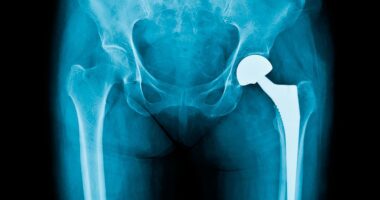Share this @internewscast.com
Your dog may be able to tell if you develop Parkinson’s disease years before any symptom, a new study suggests.
Parkinson’s disease is a progressive neurological disorder that primarily affects movement, causing symptoms like tremors, stiffness and slow movement.
Currently, this incurable disease can’t be diagnosed with a definitive test and most patients do not know they have the condition until symptoms begin.
However, now researchers from University of Bristol, UK have found that dogs can smell the signs of Parkinson’s disease (PD) through skin swabs with 98 percent accuracy well before any other test.
Lead author Dr Nicola Rooney, Associate Professor at Bristol Veterinary School said: ‘Identifying diagnostic biomarkers of PD, particularly those that may predict development or help diagnose disease earlier is the subject of much ongoing research.
‘I believe that dogs could help us to develop a quick non-invasive and cost-effective method to identify patients with Parkinson’s disease.’
As of 2025, over 1million Americans suffer from the neurological disorder and a new person is diagnosed with every six minutes, according to American Parkinson Disease Association.
Despite mostly affecting older adults aged 65 and above, about 10 percent of people are diagnosed prior to age 40 with young-onset Parkinson’s.


Actor Michael J Fox was diagnosed with Parkinson’s disease at just 29 years old while former NFL player Brett Favre was diagnosed in January 2024
During early stages of Parkinson’s disease, the neurons in the brain responsible for producing a chemical called dopamine begin to slowly break down or die.
Dopamine acts as a messenger between the parts of the brain and nervous system that help control and coordinate body movements.
The lack of dopamine causes the primary symptoms of the disease to begin appearing including tremors, drooling, cramped or small handwriting, trouble swallowing and a loss of smell.
Over time, as the neurons continue to die, the patients also begins to experience a slowness in movement, muscle stiffness, balance problems and begin to show signs of depression.
Ultimately, those suffering from Parkinson’s may be unable to stand or walk independently and require a wheelchair or are bedridden. They may also require around-the-clock care.
Medication can help manage symptoms, but their effectiveness may decrease over time, requiring adjustments to treatment plans.
In this study, published in The Journal of Parkinson’s Disease, the British researchers trained two dogs, a golden retriever and black labrador.
Both animals were given over 200 odor samples to learn how to recognize the difference in smell between skin oil (sebum) samples from individuals with Parkinson’s and those without for weeks.

Researchers have found that dogs can smell the signs of Parkinson’s disease (stock image)

The dogs were rewarded when they correctly identified a positive sample or accurately ignored a negative one.
In a double-blind trial, where neither the handlers nor researchers knew which samples were which, the dogs were able to recognize nearly all Parkinson’s-infected swabs.
Moreover, they were also able to detect Parkinson’s in swabs from people with multiple health conditions.
As a result, the researchers concluded that the disease has a unique scent signature, and dogs could help identify it through subtle changes in the sebum produced by individuals with the disease.
This could pioneer a faster, non-invasive way to detect the disease years earlier than current methods allow, experts claimed.
Claire Guest, CEO of Medical Detection Dogs, the company that collaborated with the scientists, said: ‘We are extremely proud to say that once again, dogs can very accurately detect disease.
‘There is currently no early test for Parkinson’s disease and symptoms may start up to 20 years before they become visible and persistent leading to a confirmed diagnosis.
‘Timely diagnosis is key as subsequent treatment could slow down the progression of the disease and reduce the intensity of symptoms.’
Previous research has shown that Parkinson’s disease affects the production and composition of sebum in the skin which can lead to an altered odor.
Since dogs have a highly developed sense of smell, far superior to humans, they are able to detect these subtle differences in scent and identify signs of the disease earlier than any other evaluation.












